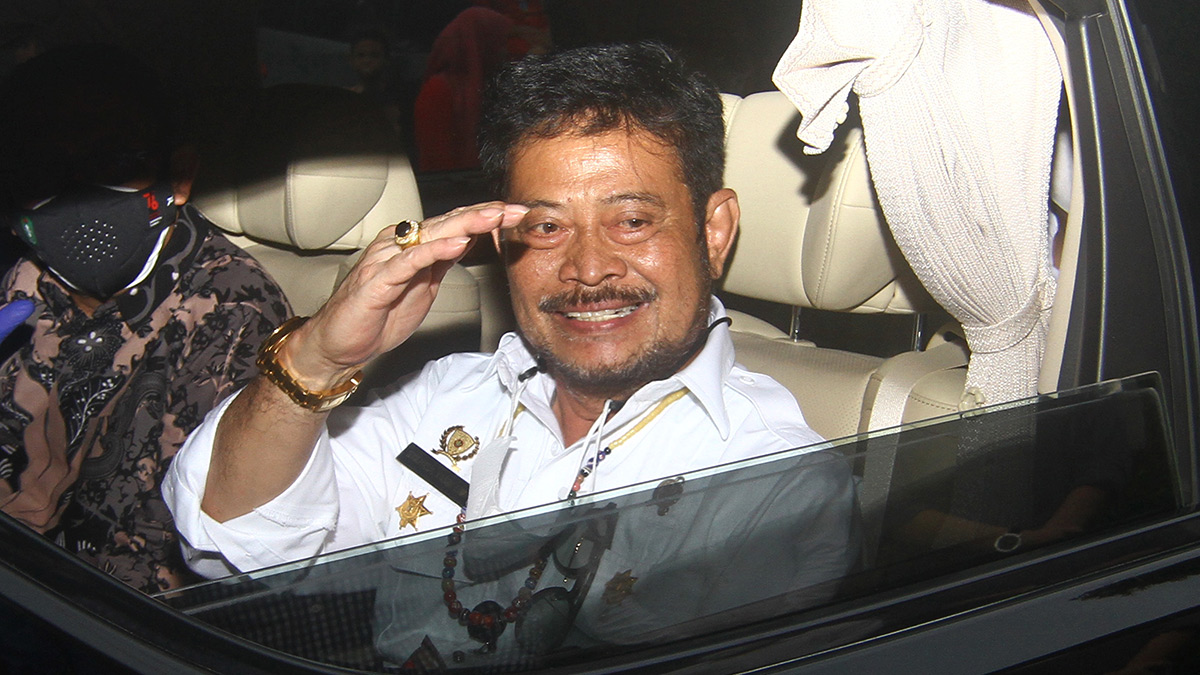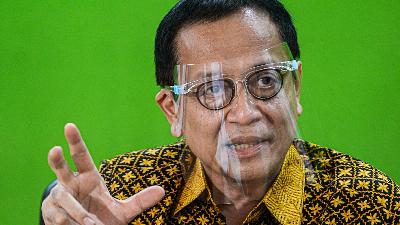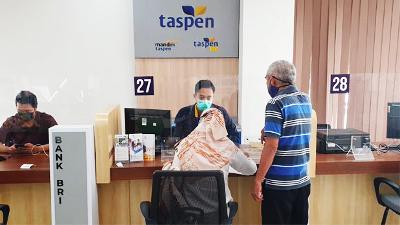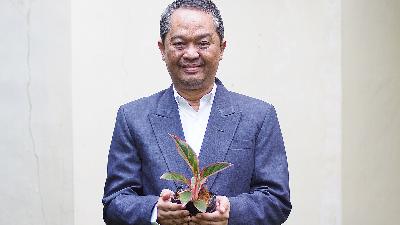I am the One Responsible
Monday, October 11, 2021
An interview with Agriculture Minister Syahrul Yasin Limpo on the food estate project. The agriculture ministry is focused on planting commodities besides cassava, which is the defense ministry’s project.
arsip tempo : 174488000378.

THERE is a rule at the agriculture ministry that journalists must not carry cellular phones when interviewing the minister. Officials took Tempo and The Gecko Project journalists’ cell phones when we came to interview Minister Syahrul Yasin Limpo about the food estates in Sumatra, Sumba, and Kalimantan on Thursday, September 30. They only allowed one cell phone for recording.
Syahrul received us in his large office room on the second floor of the Agriculture Ministry Building in Ragunan, South Jakarta. The former South Sulawesi governor from the National Democrat (NasDem) Party was accompanied by echelon I and II officials, who were busy on their cell phones throughout the interview. The minister tactfully explained the food estate project, its problems and its relationship with the defense ministry—currently managing a similar project—using slides and videos.
What is the food estate project’s concept?
The food estate project is multi-commodity. The projects are in Central Kalimantan, Humbang Hasundutan in North Sumatra, as well as Sumba in East Nusa Tenggara. On one stretch of land from 1,000 to 10,000 hectares there is more than just rice and corn but also coconut, orange, and livestock. We do this from start to finish, using mechanization. So it’s not only cultivation, we are also teaching farmers about corporations and planting schedules.
How urgent is the food estate project?
Agriculture is vulnerable to climate. The threat of drought is massive. On the other hand, there are large amounts of agricultural land being converted, around 100,000 hectares annually. If this continues, in the future it will become a problem because the population continues to grow while agricultural land continues to diminish. This is why we need to look for new regions outside Java.
What are the challenges in the field?
It’s different in each region. There is not enough people in Central Kalimantan. Furthermore, the acidity is problematic. It’s not an easy thing to increase the soil’s pH level.
Is cassava appropriate for peatland?
In theory, it’s suitable for all places. But, according to my experience as a regional head, it’s also possible for (a location) to be unsuitable. For example, planting cassava on asphalt.
What is the solution?
To recruit locals and people from outside to manage (the land). If a Bugis person sees land that vast, he would salivate.
After one year, has the food estate succeeded?
Is it 100 percent successful? I don’t dare make the claim. That it’s over 80-90 percent, yes. In Humbang Hasundutan, potato has been successful, shallots are fine, garlic is still in the learning process. Because although the land’s elevation is similar to China, the humidity is different. This is what caused garlic to fail.
Why are the yields in Humbang Hasundutan below expectation?
Director-General of Horticulture Prihasto Setyanto: The productivity of potatoes is not bad, 10 tons per hectare on land that’s being used for the first time. Shallots, 5.6 tons per hectare; while garlic is at 2.5 to 3 tons per hectare. But one of the challenges is human resources. Some farmers are diligent, but many are not. We have already tilled the land and planted it, all that’s left is maintenance, but even this is difficult. Many (plots) are not being cared for.
By the way, who is the leader of the food estate project? Why is the defense ministry involved?
I’m the one responsible. The defense ministry has its own program for building food security. They’re focused on cassava, I am not.
What is the President’s order and instruction?
Honestly, I don’t know the answer. What I know is that the President is concerned and sensitive to food security. When it comes to the interest of the people, he is sensitive.
Are you aware of the cassava project in Kalimantan, which is being run by the defense ministry?
I’m focused here. Let the defense ministry go ahead.
Is there communication with the defense minister?
Yes, there has to be among ministers.
Is the partnership between Agro Industri Nasional and the agriculture ministry’s research and development agency (Litbang) still ongoing?
I have not heard of this. Wait, that’s the wrong answer. I will check it with Litbang.
You tend to evade talking about the defense ministry’s food estate project.
Because I’m nice (chuckles).











